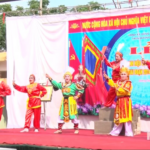In the heart of the Doai region, across generations, the ancient art of Vietnamese classical theater, Tuong, has been meticulously preserved for over half a century. This rural enclave, known as Duong Coc (Dong Quang commune, Quoc Oai district, Hanoi), is home to the Duong Coc Tuong Club, where a group of “farmer artists” dedicates itself wholeheartedly to the traditional art of Tuong.
“In the past, more than 90% of households in Duong Coc village participated in Tuong performances. They were all enthusiasts of traditional art and had no formal training from any regular educational institution,” stated Mr. Nguyen Van Ly, Chairman of the Duong Coc Tuong Club, initiating the narrative of classical Tuong, which has been continuously preserved and developed for 55 years.
The Rhythm of “Tuong” Embedded in the Culture
While many places in Hanoi still maintain intangible cultural heritages considered as “golden treasures,” such as Ca Tru, Xam singing, Do singing, and Trong Quan singing, classical Tuong stands as a rare gem. The most renowned in the land of Thang Long, with a thousand years of civilization, is Ngu Cau (An Thuong commune, Hoai Duc district), closely followed by the classical Tuong of Duong Coc in the Doai region.
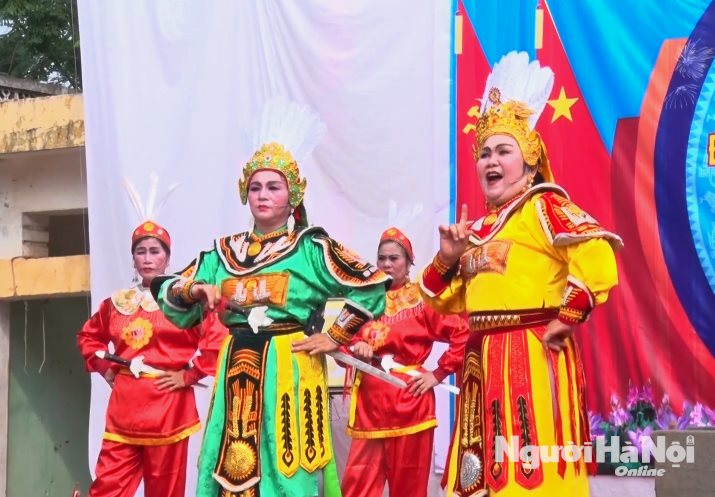
Members of the Duong Coc Tuong Club performing at a local event.
Chairman of the Duong Coc Tuong Club, Nguyen Van Ly, shared that in the 1950s, Duong Coc village had a cultural team specializing in singing and performing at the village temple during festive occasions. In the early 1960s, the team transitioned to practicing and performing cheo, a traditional Vietnamese musical genre. By 1967, during the intense wartime period, various art troupes and theaters evacuated to Duong Coc village. Among them was the Tuong Theater of Zone 5 (Dao Tan Tuong Theater, now in Binh Dinh province). During that time, the village temple in Duong Coc became the training and performance hub for artists from the Zone 5 Tuong Theater.
Recognizing the passion and enthusiasm for classical Tuong art among the farmers of Duong Coc, along with individuals possessing excellent vocal qualities who were avid observers during rehearsals and performances, artists from the Zone 5 Tuong Theater took the initiative to teach and guide the people of Duong Coc in practicing this intangible cultural heritage. With dedicated instruction from professional artists, the farmers of Duong Coc quickly immersed themselves in the world of Tuong singing and performance, seamlessly integrating this cultural form into the local spirit of Doai land. Before long, the Duong Coc Tuong Team was established, ushering in a new chapter in the cultural and spiritual development of the region.
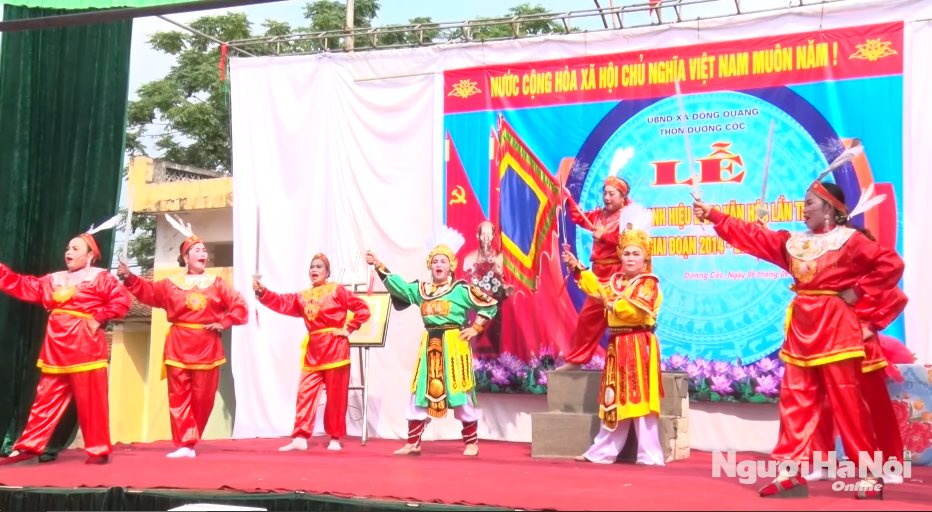
The art of Tuong singing and dancing has become ingrained in the blood of the people of Duong Coc for over half a century.
Blessed with naturally resonant Tuong voices and days spent practicing singing, perfecting movements, and mastering the intricacies of dance, the “farmer artists” of the Duong Coc Tuong Team have honed their craft. They perform to serve villages, communes in the district, and units of the armed forces stationed in various locations. Over time, the Duong Coc Tuong Team has increasingly attracted a growing number of participants.
In Hanoi and across the country, it’s rare to find a “village-level” cultural team that has harvested as many sweet fruits as the Duong Coc Tuong Club. Over its more than 50 years of formation and development, the club has earned over 200 gold medals in artistic performances, ranging from local to military region and national levels. The Duong Coc Tuong Club currently boasts 40 members, with 9 individuals having been honored with the title of Meritorious Artisan by the President of the country.

The Duong Coc Tuong Club has staged hundreds of plays, encompassing historical, traditional, and modern tuong genres. In the photo, club members are performing the court tuong play “The Flame of Hong Son.”
“To date, the Duong Coc Tuong Club has meticulously trained in hundreds of plays, including traditional, historical, and modern Tuong, serving the people and participating in stage festivals in the capital city and nationwide. A series of Tuong plays such as ‘Trung Nu Vuong raises the flag,’ ‘Quoc Toan Launches the Campaign,’ ‘The Girl of the Tich River,’ ‘Forever Shining Belief,’ ‘Tran Binh Trong,’ ‘Clams, Oysters, and Snails,’ ‘The Flame of Little Ky,’ ‘The Flame of Hong Son,’ ‘Blood and Fire to Heaven,’ ‘Sunlight on the Pang Po stream,’… have established the reputation of the Duong Coc Tuong Club. Many names within the club have also gained fame nationwide, such as Mr. Nguyen Ngoc Binh, artists Nguyen Thi Luc, Nguyen Thi Huyen, Nguyen Thi Hao, Nguyen Thi Huong, Nguyen Dinh Hiep…” proudly expressed Mr. Nguyen Van Ly.
Let the “flame” of Tuong burn forever
Fueled by the enduring passion for Tuong, many residents of Duong Coc, during moments of leisure, gather at the Cultural House of the village or the homes of club members. There, they immerse themselves in the profound melodies of ancient Tuong, reveling in boundless passion. Whenever there is a political event in the village, commune, district, or city, if invited, members of the Duong Coc Tuong Club eagerly take the stage, performing excerpts from classical Tuong plays, and spreading the intangible cultural heritage to the community and society.
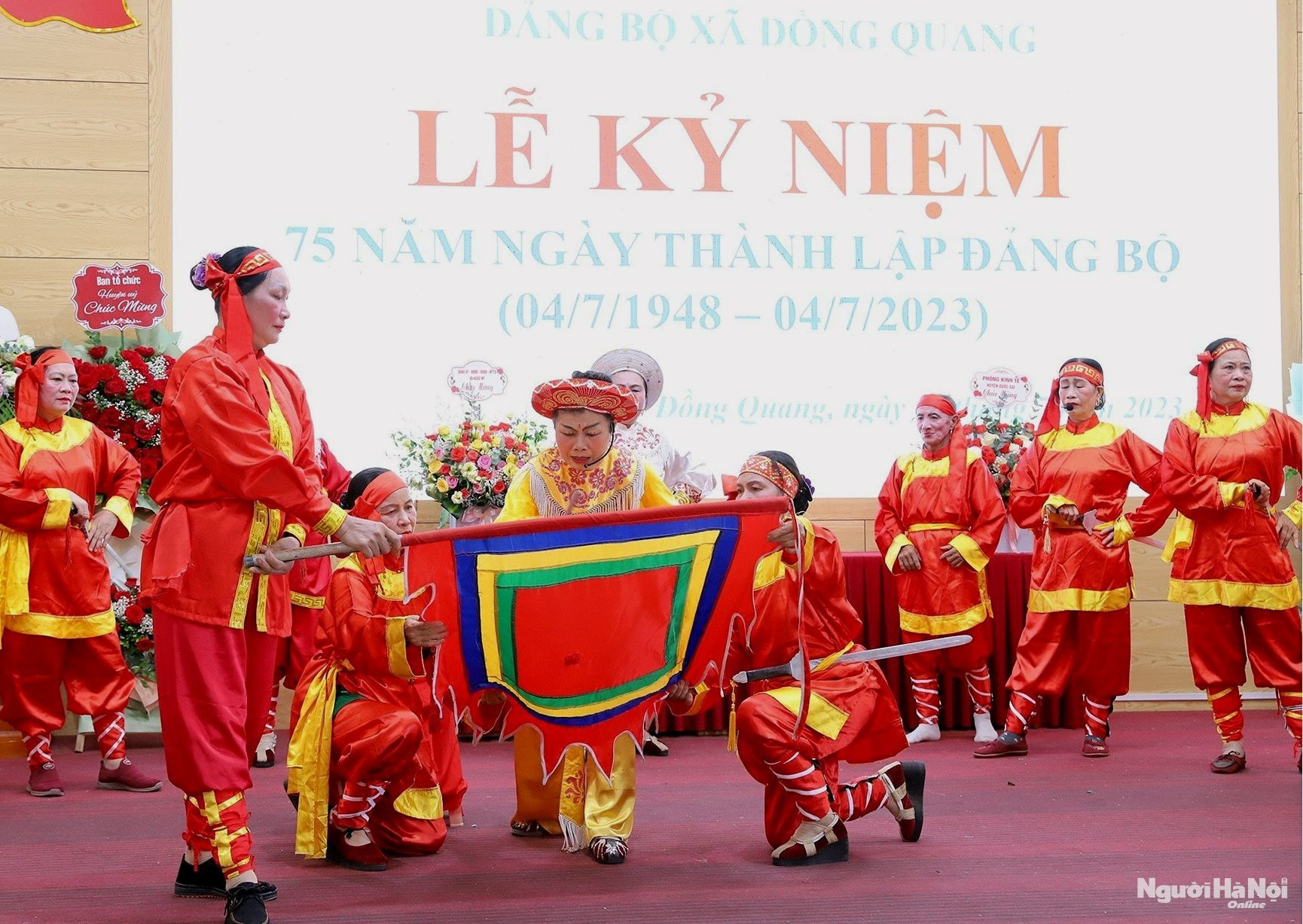
Classical Tuong performances from Duong Coc have been showcased in various events, from local to national stages.
In an effort to reignite the passion for traditional Tuong theater among the younger generation, the Hanoi City Cultural Center, the District of Quoc Oai’s Culture, Information, and Sports Center, the Dong Quang Commune authorities, and the Duong Coc Tuong Club have collaboratively organized training courses for everyone, especially the youth. The head of the Duong Coc Tuong Club stated that these training classes typically consist of 40 to 50 students, spanning a duration of approximately three months. Most participants exhibit innate talent and a profound love for classical Tuong.
“I love classical Tuong. Whenever my grandparents perform, I always follow to watch. I aspire to become a Tuong actor and hope to be mentored by the elders in the club to gain a deeper understanding of this traditional art form,” shared Nguyen Quynh Trang, a member of the Duong Coc Tuong Club.
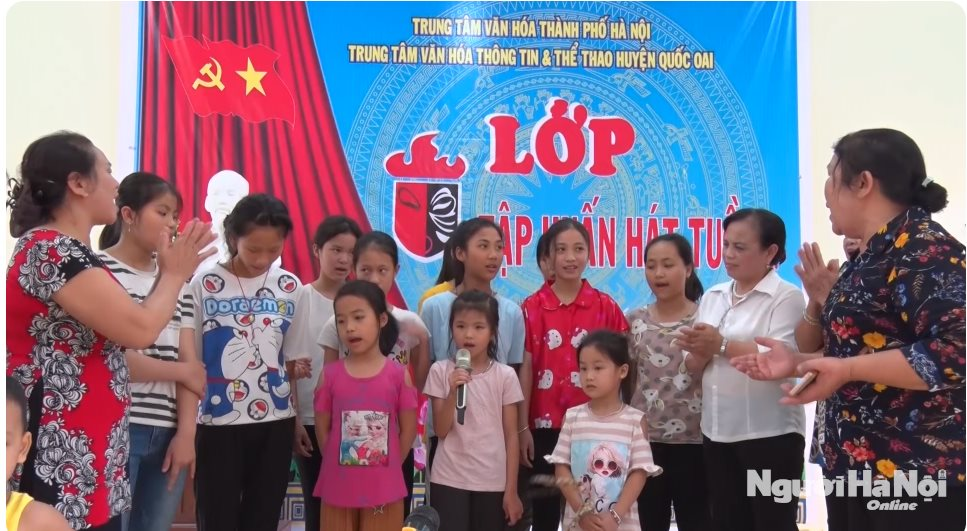
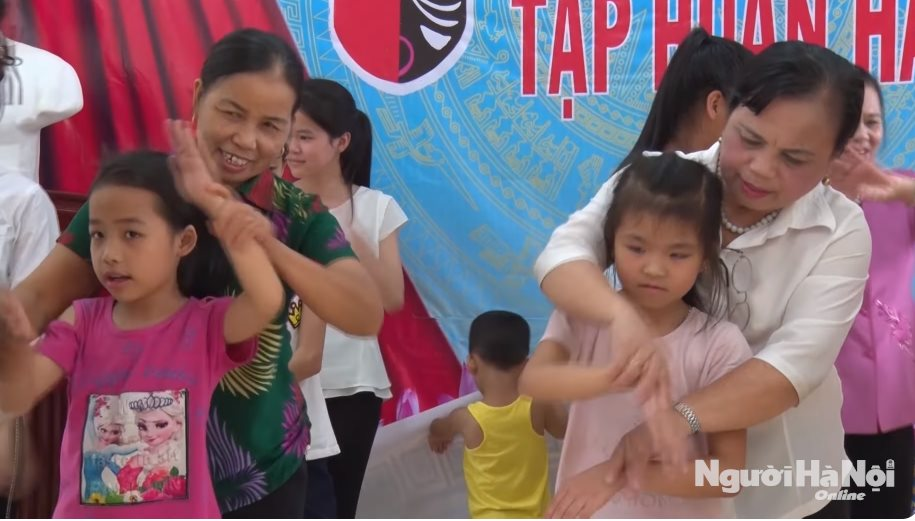
Classes in Tuong singing training for the younger generation are conducted by members of the Duong Coc Tuong Club.
According to Mr. Nguyen Van Ly, the enduring success of Duong Coc Classical Tuong can be attributed to the guidance and support received from the Ministry of Culture, Sports and Tourism, the People’s Committee of Hanoi, as well as relevant departments and agencies in the capital city, and the local authorities of Quoc Oai district to Dong Quang commune. This collective support has served as a spiritual driving force, motivating the “farmer artists” of the Duong Coc Tuong Club to remain enchanted and committed to preserving the intangible cultural heritage of Hanoi and, more specifically, Dong Quang commune.
Despite the aforementioned support, the Head of the Duong Coc Tuong Club emphasizes the necessity for financial assistance to preserve and develop this unique traditional art form that has thrived in the local community for over half a century. Over time, during performances, members of the Duong Coc Tuong Club have often had to dip into their own pockets to purchase or rent costumes and stage props.
“We earnestly hope that relevant agencies and departments will show increased concern to aid in the robust preservation of classical Tuong, fostering community cohesion. The flame of Duong Coc Tuong should never be extinguished,” expressed Mr. Nguyen Van Ly.
“Due to challenging economic conditions, the annual budget of the commune lacks provisions for the Duong Coc Tuong Club. Through this, we also propose that authorities with jurisdiction show greater interest and allocate a portion of funds for the Duong Coc Tuong Club to enable regular and improved activities.
The commune authorities will strive to collaborate with local schools, initially engaging schools in the area to have the club perform in extracurricular activities. Who knows, bringing Tuong into schools might attract students who develop a fondness for it. Having a few students out of a thousand who are passionate would be excellent. With financial support for costumes, and stage setups for short segments of about 10 minutes, the club can spread traditional art to the younger generation, potentially discovering a group of individuals dedicated to preserving the art of Duong Coc Tuong,” shared Mr. Vuong Duy Hung, Chairman of the People’s Committee of Dong Quang Commune.
Vu Pham

